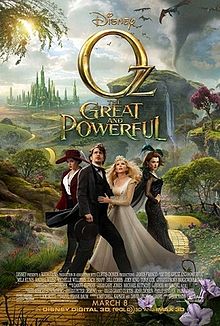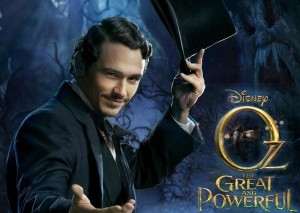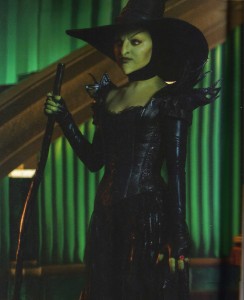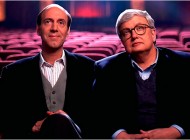OZ: Chasing Greatness at the Expense of Goodness
 “Aren’t you the great man we’ve been waiting for?”
“Aren’t you the great man we’ve been waiting for?”
There’s very little violence in The Wizard of Oz. Colin Stokes pointed this out in an interesting Ted talk that’s worth a watch. Instead of the typical “hero’s quest” wherein a lone protagonist vanquishes all evil by himself (or with one sidekick) with violence and then gets a reward (and usually the girl), The Wizard of Oz advanced ideas of teamwork, friendship, cooperation, leadership and non-violent solutions to overcome evil. Although Oscar Diggs doesn’t start out as virtuous as Dorothy Gale, and faces a story of awkward, reluctant redemption, Oz the Great and Powerful surprisingly echoes some of the same themes. It was only after the film was over I realized how devoid of violence it was, quite different from the updated Alice in Wonderland or Snow White and the Huntsman.
For me, the film worked on three levels: maybe my expectations weren’t that high, but as a film I thoroughly enjoyed the experience and even Raimi’s use of 3D (since he’s renowned for a wild visual storytelling style). Talking with my wife about certain lines, names, and events, I realized over the next few days just how solid it works as a prequel in ways that were both obvious and subtle. Lastly, long-time Raimi fans should refresh their memories with Army of Darkness, because the film, from a narrative standpoint, almost feels like an Oz-infused remake of this cult classic. How it achieved all three of these layers at once is a special accomplishment of its own.
 “I don’t want to die! I haven’t accomplished anything yet!”
“I don’t want to die! I haven’t accomplished anything yet!”
It’s a humorous line that the rapscallion Oscar Diggs cries out just before being swallowed up by a tornado near the beginning of Oz the Great and Powerful. Yet the heart of the film, and its journey, makes this a declaration we should consider seriously. Those of us who are a bit older than the film’s target audience (perhaps talking with movie-viewing children on the way home) have probably mused on this possibility at some point in our lives. The real question emerges when we start thinking about what we ought to be seeking as far as accomplishment. The through-line of the film is that Oscar is seeking the WRONG thing:
“I don’t want to be a good man… I want to be a great one.”
 It doesn’t matter what position you have in life – plumber or paleontologist, pugilist or playwright – the temptation to pursue greatness at the expense of one’s goodness is a powerful thing. Even a pastor is not immune, and thus we all face this temptation: treating people like objects for our advancement instead of objects of our love an service, as tools instead of trusted friends. This isn’t to say we shouldn’t pursue excellence, but we always need to be counting the cost, and the motivations, lest we pave over people in our personal passions and pursuit. Oscar has spent a life conning, conniving, using and abusing in the name of greatness, and the splash of overwhelming color the land of Oz brings to the would-be wizard begins to tug at his conscience.
It doesn’t matter what position you have in life – plumber or paleontologist, pugilist or playwright – the temptation to pursue greatness at the expense of one’s goodness is a powerful thing. Even a pastor is not immune, and thus we all face this temptation: treating people like objects for our advancement instead of objects of our love an service, as tools instead of trusted friends. This isn’t to say we shouldn’t pursue excellence, but we always need to be counting the cost, and the motivations, lest we pave over people in our personal passions and pursuit. Oscar has spent a life conning, conniving, using and abusing in the name of greatness, and the splash of overwhelming color the land of Oz brings to the would-be wizard begins to tug at his conscience.
“I myself am satisfied about you, my brothers, that you yourselves are full of goodness…” – Romans 15
 Naturally, it turns out that greatness emerges when Oscar turns his attention toward goodness. Perhaps people wanted more from this film, but I think the simple message and beauty provide a wonderful narrative platform for conversation with kids of all ages about our natural inclination, and the nature of goodness. Lord knows many of us didn’t learn these things when WE were kids, or we’re at least in dire need of a refresher. In truth, we live in an age when there are subjective arguments about why we should or shouldn’t strive for personal greatness, let alone even defining what goodness is.
Naturally, it turns out that greatness emerges when Oscar turns his attention toward goodness. Perhaps people wanted more from this film, but I think the simple message and beauty provide a wonderful narrative platform for conversation with kids of all ages about our natural inclination, and the nature of goodness. Lord knows many of us didn’t learn these things when WE were kids, or we’re at least in dire need of a refresher. In truth, we live in an age when there are subjective arguments about why we should or shouldn’t strive for personal greatness, let alone even defining what goodness is.
“…in order that your goodness might not be by compulsion but of your own accord.” – Philemon
 It’s a beautiful facet of the Christian life that we can celebrate the greatness of a “lone hero who vanquishes opposition”… not in ourselves, but in God. By resting in his greatness and power, we needn’t chase our own but instead pursue love, friendship and cooperation, seeking to demonstate God’s goodness that we might point to his greatness.
It’s a beautiful facet of the Christian life that we can celebrate the greatness of a “lone hero who vanquishes opposition”… not in ourselves, but in God. By resting in his greatness and power, we needn’t chase our own but instead pursue love, friendship and cooperation, seeking to demonstate God’s goodness that we might point to his greatness.
Perhaps He’s the great one we’ve been waiting for?
Questions for discussion:
- Does our longing for the lone hero have a right and proper place?
- Are we chasing greatness? What does that look like?
- Are we pursuing our own ascent at the expense of others?



